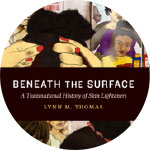HUMA launches 2020 Ataya: HUMA Interdisciplinary Seminar Series

HUMA will be continuing its regular seminar series. The series renamed Ataya: HUMA Interdisciplinary Seminar Series will tackle issues that directly address the Institute’s central research theme, On Being Human. Ataya is a tea ritual in parts of West Africa, especially Senegal, that forms part of daily life, and creates time for gossiping, planning, dreaming, preserving intimacies and nurturing relationships.
As with previous editions, our hope is to generate a cumulative and inclusive conversation around this overarching theme and its four clusters: (1) Humanity and its Limits, (2) Human/non-human, (3) Humane/Inhumane, and (4) Humanist/Anti-humanist.
HUMA seminar presentations are based on original research and/or analysis – be it theoretical or empirical. A total of five seminars are scheduled for the 1st Quarter, with speakers from different disciplines and universities in Brazil, South Africa, Norway, the Czech Republic, and the USA. The range of presenters will offer work in progress, as well as more polished.
Seminars are held on Thursdays lunchtime for one hour (from 13h00 to 14h00) in the HUMA Seminar Room, 4th floor, Neville Alexander Building, UCT Upper Campus. All seminars begin with lunch and tea (Ataya) served from 12h30 onwards, a time for conviviality, catching up and networking. Seminars are open to all staff, students, and the public.
You can find out more about each seminar and the alumni speaker below.
Programme
13 Feb 2020
HUMA Re-opening [Meet, Greet, Network]
20 Feb 2020
Brazilian universities as a battlefield: Liberal scripts and persistent colonial mindsets. Antonádia Borges (University of Brasília, Brazil)
27 Feb 2020
Logic vs Learning: What does the paradigm shift in AI mean for Africa? Ryan Nefdt (University of Cape Town, South Africa)
05 Mar 2020
(Re)creating “society in silico”: The production and reproduction of digital humans through modelling and simulations in the Cambridge Analytica case. Vito Leterza (University of Agder, Norway)
12 Mar 2020
The ambiguity of English as a lingua franca in South Africa. Stephanie Rudwick (University of Hradec Králové, Czech Republic)
19 Mar 2020
[Book Launch] Beneath the surface: A transitional history of skin lighteners. Lynn Thomas (University of Washington, Seattle, USA)
Speakers and seminars

Antonádia Borges (University of Brasília, Brazil)
Antonádia Borges is Associate Professor of Anthropology at the University of Brasília. She does research along with popular ethnographers who dedicate their daily lives to theorize, understand, and challenge capitalism and State capture. In places like Brazil and South Africa, young people and mainly women have led her to acknowledge how modernist and developmentalist machines enhance racism and segregation. Her main effort is to teach and spread challenging perspectives and the diverging political stances espoused by peripheral worlds and ontologies on issues like land, housing, and education.
Link for excerpts: https://culanth.org/fieldsights/universities-as-a-battlefield-in-brazilian-politics-today

Ryan Nefdt (University of Cape Town, South Africa)
Ryan M. Nefdt is a lecturer in philosophy at the University of Cape Town. He completed his PhD at the University of St Andrews as a member of the Arché Research Centre in Logic, Language and Epistemology. He holds an MSc in mathematical logic and formal linguistics from the Institute for Logic, Language and Computation at the University of Amsterdam and an MA in philosophy from the University of Cape Town. He has published on various topics in the philosophy of linguistics, AI and the philosophy of language that have appeared in Minds and Machines, Synthese, Linguistics and Philosophy, The Review of Philosophy and Psychology, Inquiry and journals and books. He has also conducted research at the Universities of Minnesota, Edinburgh, Yale, Texas at Austin, and Leeds.
Abstract: The field of Artificial Intelligence (AI) has seen a recent boom. Machine learning applications range from translation to healthcare. Much of the recent success is due to a paradigm shift from so-called Good-Old-Fashioned-AI (or GOFAI) techniques such as deterministic programming which are logic based (to a certain extent) to Deep Learning, based on deep neural network architectures, and with it more epistemic opacity and the infamous “black-box” problem. This talk focuses on the potential implications of this mathematical move for the African continent and its place in the Fourth Industrial Revolution.

Vito Leterza (University of Agder, Norway)
Vito Laterza is Associate Professor of Development Studies in the Department of Global Development and Planning, University of Agder, and a member of the university’s Centre for Digital Transformation. He is also visiting research fellow at the Centre for African Studies, University of Cape Town, and senior research associate of the Centre for Education Rights and Transformation, University of Johannesburg. He received his PhD from the University of Cambridge. He is an anthropologist and development scholar working on political economy, political ecology, digital transformation, higher education studies, and communication studies in Africa and the West. His work has been published in leading international journals and publishing outlets, including the Journal of Development Studies, Review of African Political Economy, CODESRIA Bulletin and Cambridge University Press. He writes regularly for international media such as Al Jazeera English and Africa Is A Country.
Abstract: Since the Cambridge Analytica affair hit the headlines, there has been a growing amount of academic and expert nonfiction literature on the powers and limitations of big data as potential tools of behavioural change in election campaigns. Among such contributions, Shoshana Zuboff’s (2018) formulation of “surveillance capitalism” offers a nuanced understanding of a new phase of capitalism where behavioural modification is at the centre of what is produced, traded and consumed. Zuboff’s work marks a significant advance in our theoretical and epistemological grasp of attempts at voters’ manipulations, such as those carried out by UK-based political campaigning firm Cambridge Analytica, which was hired by Trump for his 2016 presidential election campaign. Most contributions in this field, however, tend to analytically understate or neglect the deeper social engineering at play when models that drive algorithms and big data do not only represent human behaviour (or at least some aspects of it) or interact with it, but effectively replace what I call “analogue society” with digital substitutes. These replacements are not actually “smarter” and more “efficient” versions of the original, but autonomous forms of life that misleadingly resemble the (increasingly lost) original, rapidly moving into a Baudrillardian dystopian age of simulacra and simulations that are independent from any laws or material connections with anything outside and beyond themselves. From the point of view of material relations of production, such simulations are part of a spectacular digital capitalism revolving around the production of images, emotions and ideas that vaguely resemble analogue ones, but only respond to the imperatives of spectacular production, well captured by Guy Debord’s theory of the Spectacle. The relationship between digital and analogue society is regulated by a hierarchy of viral colonialism, where digital society increasingly replaces analogue forms, making physical reality an appendage and extension of the virtual. When Cambridge Analytica whistleblower Christopher Wylie is summarising his former company’s rogue social scientific experiment as an attempt to “re-create society in silico”, he is opening the way for a different interpretive key. As a firm operating within surveillance capitalism, Cambridge Analytica tried to steer the transition from analogue forms of behavioural change - deployed over several decades by its parent company SCL across conflict zones, “development” projects and election campaigns around the world - to digital election campaigning. The goal was to ”synthesize” the whole of society in the living lab of a virtual dashboard that would have more knowledge about humans than humans themselves could ever dream to possess - and thus influence behaviour without the awareness of targeted individuals. What Wylie and others missed is that such society is not a mere replica of the society it claims to represent: it is an autonomous and monstrous (re)creation of digital human life, following its own rules of production and reproduction, and increasingly detached from analogue humanity. The viral logic of reproduction of digital society makes it alike an invasive species that, unless stopped by conscious external intervention, will continue to crowd out all other species of life until it reaches world domination.

Stephanie Rudwick (University of Hradec Králové, Czech Republic)
Stephanie Rudwick is a senior research fellow in the Department of African Studies at the University of Hradec Králové, Czech Republic. Since 2018 she is also the editor-in-chief of the only Eastern European African Studies journal: Modern Africa: Politics, History and Society. She is an honorary associate at the University of KwaZulu-Natal and a temporary lecturer at Leipzig University. Stephanie received awards from the German and South African National Research Foundations. Most recently, she was the recipient of a fellowship at the Stellenbosch Institute of Advances Studies (STIAS) to finalise her monograph about the cultural politics of English as a lingua franca in South Africa (Routledge).
Abstract: The paper provides an introductory account of a broader project on the ambiguity of English as a lingua franca (ELF) in South Africa. The study theoretically harmonises various conceptualizations of English as a lingua franca and it critically engages with the (mostly European) literature on its ‘benign’ status and ‘communicative’ value. Grounded in linguistic anthropology, it discusses how power dynamics manifest in English lingua franca practices through an analysis of local language ideologies in historical space and context. Racialisation processes and identity politics feature prominently. The study aims 1) to advance the restricted geopolitical and disciplinary focus of previous ELF research, and 2) to identify and challenge Eurocentric views of ELF practices, which have been masked as universal. This paper ultimately provides a lens through which we see how English lingua franca practices impact (positively and negatively) on peoples’ sense of belonging. Through reflective engagement with the author’s positioning as a European researcher and editor in African Studies, she discusses how ELF might function as a (non)-communicative tool that serves, inhibits or fails South Africans in their daily interactions.


Lynn Thomas (University of Washington, Seattle, USA)
Lynn M. Thomas is Professor of History at the University of Washington. She specialises in the history of politics and gender in twentieth-century Africa. In the course of her academic career she has taught courses on African history, the global history of AIDS, comparative colonialisms, and comparative gender. In addition to being in the Department of History, she is an Adjunct Professor in the Gender, Women & Sexuality Studies Department, and in the Anthropology Department; an active member of the African Studies Program; and, currently, Interim Executive Director of the School of Drama. She is the co-editor of The Modern Girl Around the World: Consumption, Modernity, and Globalization; co-editor of Love in Africa; and author of Politics of the Womb: Women, Reproduction, and the State in Kenya.
Beneath the Surface – about the book: For more than a century, skin lighteners have been a ubiquitous feature of global popular culture—embraced by consumers even as they were fiercely opposed by medical professionals, consumer health advocates, and antiracist thinkers and activists. In Beneath the Surface, Lynn M. Thomas constructs a transnational history of skin lighteners in South Africa and beyond. Analysing a wide range of archival, popular culture, and oral history sources, Thomas traces the changing meanings of skin colour from precolonial times to the postcolonial present. From indigenous skin-brightening practices and the rapid spread of lighteners in South African consumer culture during the 1940s and 1950s to the growth of a billion-dollar global lightener industry, Thomas shows how the use of skin lighteners and experiences of skin colour have been shaped by slavery, colonialism, and segregation as well as by consumer capitalism, visual media, notions of beauty, and protest politics. In teasing out lighteners’ layered history, Thomas theorizes skin as a site for antiracist struggle and lighteners as a technology of visibility that both challenges and entrenches racial and gender hierarchies.
Read the introduction here: https://www.dukeupress.edu/Assets/PubMaterials/978-1-4780-0642-8_601.pdf
